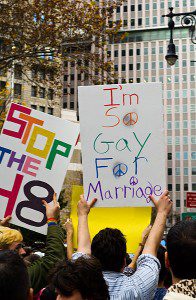
I want to register a public protest against the lazy and intellectually dishonest use of loaded questions and the employment of potent but inaccurate epithets in order to marginalize one’s opponents.
I take this stance partly because I’m tired of it being done to me, but also as a matter of principle. It’s done too often, all over the place.
For example, it isn’t racist to differ with Barack Obama or even to criticize Martin Luther King. In fact, one might argue quite the opposite, that it’s actually racist to rank their melanin level so high in importance that one can’t regard them as simply human beings — human beings with whom one can agree or disagree just as freely as one would agree or disagree with anybody else.
There are actual racists, of course. But their racism certainly isn’t limited to expressing disapproval of someone’s action or expressing disagreement about an issue of public policy.
Likewise, simply supporting California’s Proposition 8 (aka “Proposition H8”) or disapproving of the Supreme Court’s recent decision in Obergefell v. Hodges doesn’t prove one a “hater.” On the contrary, continually labeling people as “haters” merely because they opposed the redefinition of marriage seems so unduly hostile that those who casually toss the label around as a cheap and easy way of stigmatizing, marginalizing, and delegitimizing others with whom they disagree may themselves be the best candidates for the title.
After all, Barack Obama claimed to oppose gay marriage until mid-2012. And it wasn’t until 2013 that Hillary Clinton decided to publicly endorse redefining marriage. And, even then, until earlier this year she continued to insist, publicly at least, that it should be redefined on a state by state basis rather than on the federal level. Were Mr. Obama and Mrs. Clinton “haters” until just a few months ago?
It’s hypocritical for partisans to lament the uncivil nature of contemporary politics while blithely demeaning those who disagree with them as “haters” and “bigots.” This isn’t the language of civil discourse. It’s the rhetoric of demonization and dehumanization. It has no place in ordinary speech within a democracy.
Likewise, tossing the term anti-Mormon around with reckless abandon cannot be justified. There are, alas, real anti-Mormons. The term refers, simply and by its straightforward etymology, to opposition to Mormonism and/or Mormons. Mere criticism of this or that aspect of Mormon faith, culture, or behavior — to say nothing of mere disagreement — is not enough in and of itself to deserve the label. Thus, while I disagree with him and disapprove of his hostile tone and am somewhat shocked by his apparent commitment to criticizing my faith, I don’t think that Phillip Jenkins has yet earned dishonorable designation as an anti-Mormon. He’s working on it, but he does lots and lots of other things, too, and the title isn’t and shouldn’t be easily earned.
Finally, people who continually suggest that those who disagree with them politically seek war, want to repeat the errors of history, and/or don’t care about poverty and human suffering are violating elementary rules of reasonable and respectful discussion. Nobody who isn’t a sociopath is indifferent to human suffering, unmoved by the thought of repeating known historical catastrophes, or eager for bloodshed and violence.
Posted from Santa Fe, New Mexico











